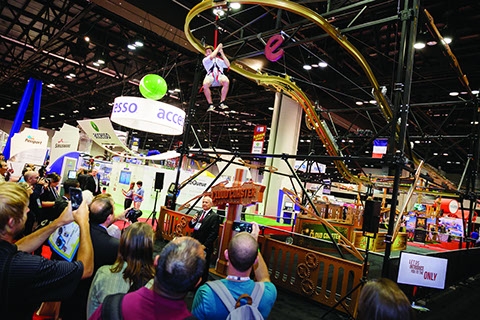IAAPA Providing Innovation and Fun for Nearly a Century

In early 1917, a few amusement park and other outdoor entertainment representatives gathered at the Congress Hotel in Chicago with the goal of establishing an association for the industry. The following year, the National Outdoor Showmen’s Association (NOSA) was officially formed.
When exhibits first appeared at the second Annual Convention, there were only three manufacturers featuring new amusement devices. But the following year, there were 45 exhibits and the trade show element was official.
During those early years, the convention moved around to various hotels within Chicago, the Pennsylvania Hotel in New York City, and the York and Royal York hotels in Toronto. The name changed to the National Association of Amusement Parks (NAAP) in 1920.
The association and its annual event weathered the economic storm during the Great Depression, even as the number of parks was dwindling. As World War II got underway, association leader Alfred R. Hodge expressed the relevance of amusement parks: “It has long since been proved that perhaps the finest antidote for fear is fun, and that is our business … Fun is a gloom chaser; fun drives out discouragement and despair; fun pushes aside pessimism.”
After the war, the baby boomers fueled an upswing in park attendance during the early 1950s. Disneyland led the industry rejuvenation with themed amusement parks. And so the 1956 meeting was held at Disney’s California park.
By the time NAAP reached the half-century milestone in 1968, amusement parks had changed dramatically from outdoor groves to the imagination-driven theme parks of the modern era.
In 1972, in response to another industry shift, the name changed to the International Association of Amusement Parks and Attractions (IAAPA), and membership broadened to include waterparks, family entertainment centers, and other attractions during the 70s and 80s.
IAAPA’s 1986 Annual Convention and Trade Show in Orlando drew more than 13,000 attendees – nearly double attendance from just five years before. During that time, amusement parks were also spreading into Asia, South America, and the Middle East, broadening the audience even more.
During the mid-1990s, membership expanded once again to include zoos, aquariums and museums. A Summer Meeting was also launched in Hong Kong.
In 1995, IAAPA partnered with Give Kids the World (GKTW) as the association’s official charity, with members donating gifts, toys, equipment and supplies. In addition, member facilities provide complimentary admission to their parks for GKTW children.
Over the years, the IAAPA Attractions Expo has moved from Chicago to New York, Atlanta, Las Vegas, and now to Orlando. IAAPA also produces two other regional shows: Asian Attractions Expo and the Euro Attractions Show.
Colleen Mangone, IAAPA Media Relations Director, attributes the show’s growth to the fact that amusement parks and attractions are always seeking fresh and interesting ways to entertain guests and encourage repeat
business.
“They attend IAAPA Attractions Expo looking for the next business-changing idea and the trade show floor is filled with thousands,” Mangone said. “The innovative and creative minds at the manufacturer and supplier
companies bring with them the latest in rides and slides, intricate theming, more efficient ways to queue, interesting merchandise, challenging midway games, tasty food and beverages, and much more.”
At the 2015 IAAPA Attractions Expo, 32,900 registered attendees from 120 countries met in Orlando. The show floor hosted 1,066 exhibiting companies in more than 125 product categories, covering 558,610 net square feet.
Long-term exhibitors include: The Philadelphia Toboggan Coasters, Inc. (94 years), Gold Medal Products Co. (64 years), and Anchor Industries, Inc. (60 years).
“The success of the show really speaks to the importance and value of family entertainment,” said Mangone. “Friends and families gather at amusement parks and attractions to enjoy time together and they come away with lifelong memories. The need for those shared family entertainment experiences is evergreen. Making people happy and putting smiles on our guests’ faces is what our industry is all about. There’s much more need for that now than ever before and that demand drives what we do and the longevity of our expos.”


Add new comment